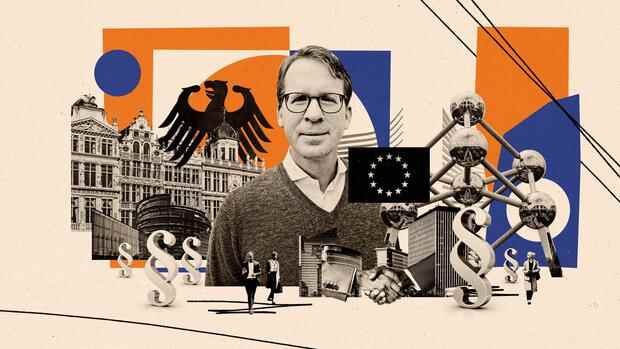Every week Moritz Koch, head of the Handelsblatt office in Brussels, analyzes trends and conflicts, regulatory projects and strategic concepts from the inner workings of the EU. Because anyone who is interested in business needs to know what’s going on in Brussels. You can reach him at [email protected].
The EU commissioners’ chiefs of staff meet once a week, usually on Mondays. The so-called Hebdo meeting is one of the most important dates for the Brussels bureaucracy, because this is where the Commission’s agenda is tied down.
Actually, the round this week was supposed to clear the way for a prestige project by EU Commission head Ursula von der Leyen: Europe’s “Global Gateway Partnerships”. Behind this is the plan to use infrastructure aid to increase the EU’s foreign policy weight and to stand up to the Silk Road initiative of the Chinese regime.
But after the Handelsblatt reported on the draft strategy on Friday, it was postponed, probably for a few weeks. Fortunately, it must be said that the paper would have been an embarrassment for the EU. Pretty much every language is spoken in multilingual Brussels, except for the language of power – that is the misery of the European Union.
A strategic infrastructure policy could help Europe to compensate for its geopolitical weaknesses. The Commission only threatens to stumble over this opportunity. What she has come up with so far is a composition of empty phrases. The EU strives for strategic autonomy. But too often it just produces pseudo-strategic gossip.
Top jobs of the day
Find the best jobs now and
be notified by email.
A few cosmetic changes in the draft strategy will not be enough to save the project. The administrative framework in which the strategy is to be embedded is a faulty design. The Directorate-General for International Partnerships, the EU’s Ministry of Development, is responsible for “Global Gateway”.
Infrastructure policy is not development aid
But infrastructure policy is not development aid, at least not if it is to be used strategically. It is a design tool, the hardest form of power Brussels has at its disposal.
Power is the ability to assert interests, even against resistance. The EU lacks military resources, but it has enormous economic power and therefore a lot of money. Europeans are the world’s largest donors of development aid. Using part of it for a policy that prevents more and more countries from falling into China’s orbit – that is what “Global Gateway” should be about.
But that requires taking clear positions, formulating priorities and naming specific projects. That is exactly what is missing so far. The problem is that EU development experts were mentally stuck in the 1990s, tirelessly dreaming of win-win solutions and not wanting to hear of a system rivalry with China.
Commissioning these people, of all people, with geo-economic interest politics makes about as much sense as recruiting pacifists for a special command of the army.
More: Europe needs a containment strategy against Facebook – but loses sight of the bigger picture
